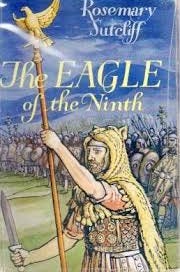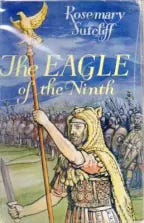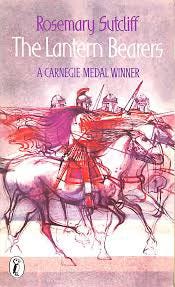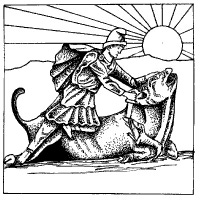If you feel that life has passed you by in any way, I can think of no better novel to immerse yourself in than Rosemary Sutcliff’s The Eagle of the Ninth (1954). Centurion Marcus Flavius Aquila knows exactly how it feels!
Chapter One sees Marcus at the outset of his military career, his adult life stretching out before him. Stationed in Britain and enjoying his first command, Marcus marches his Cohort west to take their turn of duty at the frontier post of Isca Dumnoniorum (Exeter). He has his future all mapped out, aspiring to become the Prefect of an Egyptian Legion and then, in retirement, to buy back his late mother’s farm in the Etruscan hills. But the plan is scuppered in a stroke when Marcus is injured in a British revolt and is rendered unfit for further service.
The Eagle of the Ninth has twenty-one chapters and the above sequence takes us to the end of Chapter Four. For the next six chapters, nothing much happens in terms of action and events and Sutcliff would surely be panned in a Creative Writing workshop today for letting the pace and tension slacken. Yet when we think about what makes this book so relatable and realistic, we have much to be thankful for that she doesn’t skimp on the length of time - almost two years - it takes Marcus to acknowledge what has happened and find his feet again. Though young, he has already lost both his parents, and the forced abandonment of his army career, in which he had invested so much mental and emotional energy, is a parallel bereavement. He needs time and space to feel the weight and depth of his loss. Only then, when the pain and grief is fully felt and lived through, only then can the wheel of life start to turn again.
Marcus spends his recuperation at his uncle’s house in Calleva Atribatum (Silchester). Over time a different sort of cohort - a cohort of trusted comrades - begins to form around him: Esca, the slave who becomes his best friend; Cub, the wolfhound; and Cottia, the spirited ‘girl next door.’ Then, with all these bonds in place and Marcus more accepting of his situation, it becomes crystal clear to him - on a summer’s evening and as if by magic - what his future direction has to be. His deeper destiny, his true vocation - not the one he had originally constructed - was waiting for him all along. The same applies to ourselves. The calling, whatever it is, can take a while to become plain through the fog of the unconscious barriers and ‘shoulds’ and ‘oughts’ we so often put in its way.
So Marcus heads off with Esca to the far north of Britain to find and retrieve the lost Eagle standard that Marcus’s father - himself a Cohort Commander - had carried with him on his march into the Caledonian mists with the ill-fated Ninth Legion twelve years previously. Neither the Eagle nor any of the soldiers were fated to return. But Marcus has a purpose and a goal now, and the second half of the book tells his story in an exciting, quite ‘unputdownable’ fashion.
All’s well that ends well then? It would be easy enough for a sceptic to point out that such neat and fulfilling arrangements are by no means a given in real life. But I think this misses the point. What we have in The Eagle of the Ninth is not so much a ‘happy ending’ but the unfurling of a wider pattern which we fail to perceive and participate in until we’re properly on the path that we’re meant to take. By embarking on his quest Marcus sets in motion a series of processes that bring healing, resolution and growth to many disparate people, both living and dead. His actions stretch forward into the future too. Decisions he makes in the final chapter allow his descendants to play pivotal roles in Sutcliff’s later Roman novels, The Silver Branch (1957) and The Lantern Bearers (1959) as well as her Arthurian retelling, Sword at Sunset (1963), and also Dawn Wind (1961), set at the time of the Saxon takeover, and even as far on in time as the Norman Conquest in Shield Ring (1956). We can’t see into or control the future, but if we can find our life’s purpose and tune into this deep, harmonious pattern, we will be able then to set a creative, constructive precedent for the generations to follow. Something to build on that is both stable and inspiring.
So that’s two ‘Ps’, as it were, that we’ve looked at - purpose and pattern. There’s a third ‘P’ - prayer - which in my view is the key element which unlocks the power of the other two. While not coming over as particularly pious or otherworldly, it is clear that Marcus has a profound personal relationship with Mithras, the god of Sun and Light and patron of the Roman legionaries. He calls upon this deity for aid at numerous points and his prayers, in one way or another, are never left unanswered. This, I believe, is because Marcus prays throughout like he really means it. His prayers are real and raw and flow from the deepest source of his being. Here is a good example from Chapter Three with the besieged Romans of Isca Dumnoniorum in desperate need for the mist to clear so that the next fort along can see and respond to their distress signal.
Suddenly Marcus found that he was praying, praying as he had never prayed before, flinging his appeal for help up through the grey to the clear skies that were beyond. ‘Great God Mithras, Slayer of the Bull, Lord of the Ages, let the mists part and thy glory shine through! Draw back the mists and grant us clear air for a space, that we go not down into the darkness. O God of the Legions, hear the cry of thy sons. Send down thy light upon us, even us, thy sons of the Fourth Gaulish Cohort of the Second Legion.’
A short while later:
Marcus touched Drusillus, who was beside him, on the shoulder. ‘Is it my imagining, or are the hills growing clearer?’ Drusillus was silent a moment, his grim face turned towards the east. Then he nodded. ‘If it is your imagining, it is also mine.’ Their eyes met quickly, with hope that they dared not put into any more words, then they went each about their seperate affairs.
Mithras helps in a different way a few chapters on when Marcus is feeling apprehensive about going under the knife for the second time to heal his wounded leg:
There came a sudden pattering across the floor, and a cold muzzle was thrust against his shoulder. He opened his eyes to see Cub’s grinning head within a few inches of his own. ‘Thanks Cub,’ he said, and shifted a little to catch the great head between his hands as Cub put his fore-paws on the cot and blew lovingly in his face. It was near to sunset, and the light of the westering sun was flooding into the cell, splashing like quivering golden water on walls and ceiling. Marcus had not seen it come, and it seemed to break singing on his sight, as a fanfare of trumpets breaks upon the ear. The light of Mithras, springing out of the dark.
Crucially, this is the episode that flashes into Marcus’s mind at the hinge point of the story - the darkest recesses of the holy cave of the Epidaii tribe in the wilds of the Highlands. Marcus and Esca have located the Eagle. It is right in front of them and there for the taking, but the blackness of the place and the spiritual and emotional oppression it engenders are so intense as to bring both young men to the brink of insanity:
It might only have been bad air, or a fault in the wick - or it might not. Marcus said urgently, ‘Think Light! Esca, think Light!’ And even as he spoke, the flame sank to a blue spark … Marcus felt not only the many-fingered dark, but the walls and roof themselves closing in on him, suffocating him as though a soft cold hand was pressed over his nose and mouth. He had a sudden hideous conviction that there was no longer a straight passage and a leather curtain between them and the outer world, only the earth-piled mountain high over them, and no way out. No way out! The darkness reached out to finger him, softly. He braced himself upright against the cold stones, putting out his will to force the walls back, fighting the evil sense of suffocation. He was doing as he had told Esca to do, thinking Light with all the strength that was in him, so that in his inner eye, the place was full of it: strong, clear light flowing into every cranny. Suddenly he remembered the flood of sunset light in his sleeping-cell at Calleva, that evening when Esca and Cub and Cottia had come to him in his desperate need. He called it up now, like golden water, like a trumpet call, the Light of Mithras. He hurled it against the darkness, forcing it back - back - back.
How long he stood like that he never knew, until he saw the blue spark strengthen slowly, sink a little, and then lick up suddenly into a clear, small flame …
The modern world does this to us at times. It makes us feel that there’s no way out, no way through, and only one way of living and being in the world - barrelling forward as a random, atomised individual from birth to death and through one societally-enforced hoop after another with no permission or encouragement to engage with any level of reality beyond the materialistic grid imposed on us by the spirit of the age. We need then to cry out like Marcus does, with all his spirit and conviction, to someone or something greater and higher than ourselves. Who knows what then might happen? Who knows what wheels might then be set in motion?
And if you don’t believe in God, I would urge you, if you can, to bring to mind some rich and happy moment from your past - a beautiful, fulfilling occasion, however brief or transient - and call out to that for succour and support. If you call upon the Light, in whatever shape or guise, that Light will most assuredly respond. This is what Marcus does in his misery on the night of December 24th, just a few months after his discharge, as he recalls his initiation into the Mithraic mysteries one year before, little realising that the very next day at the Saturnalia Games and his first sight of Esca, the wheels of his life will start once more to turn:
He moved an ivory chess piece a little blindly, seeing not the black-and-white dazzle of the board before his eyes, but that gathering of a year ago, filing out by the Praetorian gate and downhill to the cave. He could see the crest of the Centurion in front of him up-reared blackly against the pulsing fires of Orion. He remembered the waiting darkness of the cave; then, as the trumpets sounded from the distant ramparts for the third watch of the night, the sudden glory of candles, that sank and turned blue, and sprang up again; the reborn light of Mithras in the dark of the year.






